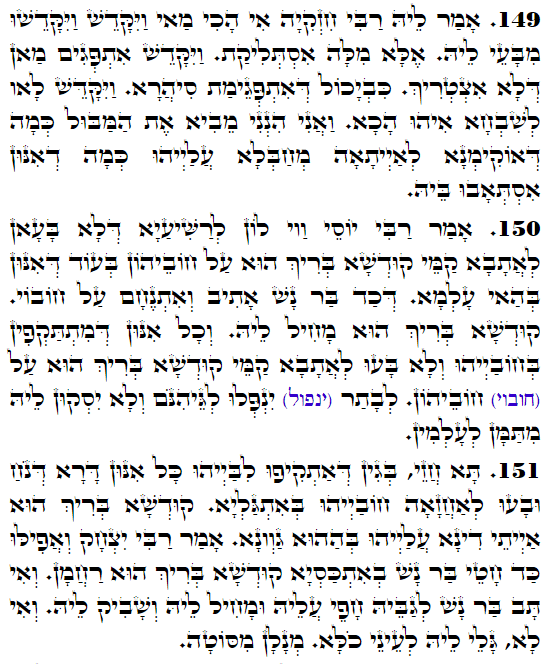Daily Zohar # 4381 – Noach – Sin and correction
Daily Zohar 4381

Hebrew translation:
150. אָמַר רַבִּי יוֹסֵי, אוֹי לָרְשָׁעִים שֶׁלֹּא רוֹצִים לָשׁוּב לִפְנֵי הַקָּדוֹשׁ בָּרוּךְ הוּא עַל חֲטָאֵיהֶם בְּעוֹד שֶׁהֵם בָּעוֹלָם הַזֶּה. שֶׁכְּשֶׁאָדָם שָׁב וּמִתְנַחֵם עַל חֶטְאוֹ, הַקָּדוֹשׁ בָּרוּךְ הוּא מוֹחֵל לוֹ, וְכָל אוֹתָם שֶׁמַּחֲזִיקִים בַּחֲטָאֵיהֶם וְלֹא רָצוּ לָשׁוּב לִפְנֵי הַקָּדוֹשׁ בָּרוּךְ הוּא עַל [חֲטָאִים] חֲטָאֵיהֶם, אַחַר כָּךְ [יִפֹּל] יִפְּלוּ לַגֵּיהִנֹּם וְלֹא יַעֲלוּ מִשָּׁם לְעוֹלָמִים.
151. בֹּא רְאֵה, מִשּׁוּם שֶׁחִזְּקוּ אֶת לִבָּם כָּל אוֹתָם דּוֹרוֹ שֶׁל נֹחַ וְרָצוּ לְהַרְאוֹת חֶטְאָם בְּגָלוּי, הֵבִיא הַקָּדוֹשׁ בָּרוּךְ הוּא עֲלֵיהֶם הַדִּין בְּאוֹתוֹ הַגָּוֶן. אָמַר רַבִּי יִצְחָק, אֲפִלּוּ כְּשֶׁחוֹטֵא אָדָם בְּנִסְתָּר, הַקָּדוֹשׁ בָּרוּךְ הוּא רַחֲמָן. וְאִם שָׁב בֶּן הָאָדָם אֵלָיו, מְכַסֶּה עָלָיו וּמוֹחֵל לוֹ וּמְוַתֵּר לוֹ. וְאִם לֹא, הוּא מְגַלֶּה אוֹתוֹ לְעֵינֵי כֹל. מִנַּיִן לָנוּ? מִסּוֹטָה.
.
Zohar Noach
Continued from previous DZ
#149
Rabbi Hezekiah said to him, then, what is “וַיִּקָּדֵשׁ” “He was hallowed”? It should say “וַיִּקָּדְשׁוּ” “they became hallowed” in the plural for the children of Israel. He answers that their actions caused a flaw in the moon, which is the aspect of the Nukva. The plural form of the word is concealed in the text so that it won’t be a praise for them. Because of the people’s sins, “I bring the Flood ….to destroy…” (Genesis 6:17) to tell that the destructive force, the “destroyer,” is called “the Flood,” which is the correction to their sins. The “water of Meribah (quarrel)” (Numbers 20:13) was also related to the negative actions of the people. We learned that the destroyer came upon them as it defiled them.
Lesson;
The correction for sins is always related to the act itself. Water represents Chassadim. The generation of the Flood corrupted the aspect of Chassadim that came from Hashem with their actions, and to correct that, the Flood was released.
#150
Rabbi Yossi said, Woe to the wicked who do not want to do Teshuva before the Holy One, blessed be He, for their sins while they are in this world. When a person repents and regrets his sin, the Holy One, blessed be He, forgives him, and all those who held on to their sins and did not do Teshuva for their sins, before the Holy One, blessed be He, then they will fall into Gehennam and stay there forever without ability to rise.
Lesson;
Gehennam is where the person’s sins are cleansed from his soul through a painful process. The process elevates the soul through the levels until he is cleansed and can move to the Garden of Eden, where there are also levels to climb. That is why it is good to do positive actions for the departed souls of family members. Torah studies are automatically beneficial for them because it is spiritual. Dedicating a bench in the public park is nice but much lower than
#151
All those people in Noah’s generation hardened their hearts and wanted to show their sin openly; the Holy One, blessed be He, brought judgment on them in the same way, openly. Rabbi Yitzchak said when a person sins in secret, the Holy One, blessed be He, is merciful, and if the person does Teshuva, he forgives him and clears him. And if he doesn’t do Teshuva, he reveals his sin to all. We learn that from the “unfaithful woman” (Numbers 5:12).
Lesson;
The unfaithful woman case in the Torah is about a husband who suspects his wife of being unfaithful to him. He takes her to the priest, who lets her drink sacral water with earth from the floor of the Tabernacle. If she is clean from sin, she is blessed; if not, her thigh shriveled and her belly swollen. If she sinned in secret, she gets exposed in public.
Friday would be a good day to make a ** Donation, especially if you didn’t donate in the past week. Giving on Friday, which is an aspect of Yessod, expands the vessel for the Light and honor of Shabbat.
** Your donation doesn’t have to be given to the same place every week. You can alternate or split your donation among those who benefit you spiritually.

 Previous: Noach
Previous: Noach

